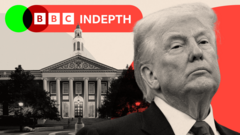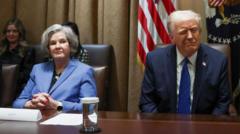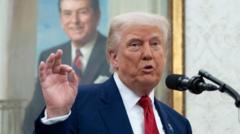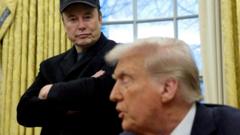The Trump administration's aggressive stance against Harvard threatens to alter the dynamics of American universities, challenging the very foundation of higher education and raising alarms among scholars and students about the future of academic freedom.
The Consequences of Trump's Clash with Harvard: A New Era for American Higher Education

The Consequences of Trump's Clash with Harvard: A New Era for American Higher Education
Trump's recent actions towards Harvard signal a shift in the relationship between government and higher education, raising concerns across the academic landscape.
In recent days, former President Donald Trump has escalated his conflict with Harvard University, with potential implications that could reach far beyond the walls of this prestigious institution. Trump's threats to redirect $3 billion in research funding to vocational schools and his latest directives to federal agencies to scrutinize Harvard’s government contracts represent a significant shift in the relationship between higher education and federal authority.
During a press conference, Trump stated that "Harvard's got to behave themselves," reflecting his administration's view that the university does not align with what they consider American values. This confrontational approach is part of a broader wave of actions aimed at reshaping the landscape of American higher education, particularly targeting elite institutions believed to exhibit liberal bias.
Reactions from Harvard students illustrate an atmosphere of uncertainty and fear. A graduate, wishing to remain anonymous due to visa concerns, expressed that if Harvard can face such aggressive tactics, no university is safe from governmental intervention. The implications suggest a possible erosion of the Democratic Party's traditional support bases, with campuses increasingly viewed as battlegrounds for cultural and political influence.
This confrontation has roots in various grievances posited by the Trump administration, including claims of antisemitism on campus, exacerbated by recent anti-Israel protests. Following these protests, Harvard faced heightened scrutiny over how it addresses antisemitism and alleged bias against Jewish students.
The administration’s motivations seem to extend beyond just university policies, embodying a strategy to diminish the liberal stronghold perceived to dominate higher education. The White House is demanding that universities like Harvard reform their diversity programs, alter admissions processes, and engage in rigorous screening of foreign students, all while potentially cutting billions in federal funding.
The larger motive appears to be a concerted effort to reframe educational institutions in a manner consistent with conservative values. Observers note that if Trump's aggressive strategy proves successful, it could revolutionize higher education, leading to lasting changes in curriculum and university governance.
As Harvard battles Trump's initiatives in court, the fallout could redefine how higher education operates in America. While some in the conservative camp argue for a necessary shake-up of what they see as liberal indoctrination, others fear that reducing federal funding could stifle academic freedom and diversity of thought, core tenets of higher education.
Responses from Harvard leadership stress the university's commitment to uphold its educational mission and serve the nation. However, the present climate indicates that the ivory towers of academia are no longer untouchable, as the intertwining of politics and education continues to evolve in unprecedented ways.
As the Trump administration intensifies its campaign against Harvard, many wonder whether this is an isolated incident or the beginning of a broader trend aimed at reshaping higher education across the United States. The once clear distinction between political discourse and academic inquiry appears increasingly blurred, prompting essential questions about the future of universities and their role in society.




















